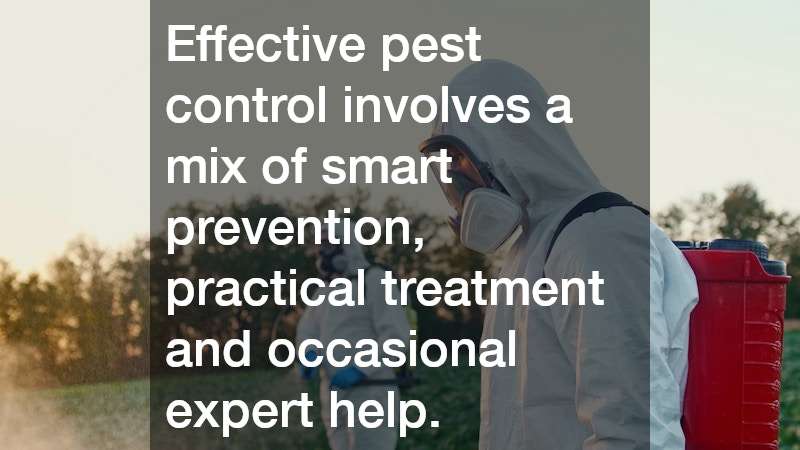Pest control is an essential part of maintaining a safe and healthy home environment. Whether you are dealing with ants in the kitchen, cockroaches under the sink or rodents in the garage, choosing the right method to manage pests can make all the difference. A proactive approach not only keeps your property clean but also helps avoid structural damage and health hazards.
The most effective pest control methods typically combine preventative strategies with targeted treatments. No single solution works for every household, so it is important to understand your options and choose what suits your needs. From natural deterrents to professional services, a tailored approach will often deliver the best outcome.
Inspection and Identification
The first step in any successful pest control effort is understanding what you are dealing with. Different pests have different behaviours, breeding patterns and entry points. Identifying the specific type of pest and locating where they are coming from is key to preventing future infestations.
A thorough inspection can reveal signs such as droppings, damaged food packaging or chewed wires. These clues not only confirm the presence of pests but also indicate how severe the problem might be. Once identified, you can match the right method to your situation, whether it’s a minor ant problem or a recurring rodent issue.
Prevention Through Cleanliness
One of the most effective ways to control pests is to make your home an unattractive place for them to live. Maintaining cleanliness is a simple yet powerful strategy. Ensuring that food is stored in sealed containers, bins are emptied regularly and crumbs are cleared off floors and benches will discourage many insects and rodents.
Moisture control is also important. Many pests are drawn to damp environments, so fixing leaks and improving ventilation around kitchens, bathrooms and laundry areas can be an effective way to prevent infestations. Blocking entry points by sealing cracks, gaps in windows or under doors can keep unwanted guests out before they have a chance to settle in.
Natural and Chemical Treatments
When prevention is not enough, targeted treatments may be necessary. Natural methods, such as vinegar sprays for ants or eucalyptus oil to deter cockroaches, are often used in the early stages of an infestation. These can be a good option for those who prefer environmentally friendly solutions or have pets and young children in the house.
However, for more severe infestations, chemical treatments may be required. Over-the-counter options are available for things like ants, spiders and wasps, but these should always be used carefully and according to label directions. In many cases, store-bought solutions offer temporary relief but may not address the root of the problem.
Professional Pest Control Services
Sometimes, the problem is too large or persistent for home remedies to be effective. In such cases, hiring a professional pest control service is often the most reliable choice. Professionals bring experience, equipment and products that are not available to the average consumer.
A licensed technician can assess your property, identify hidden infestations and apply targeted treatments that are safe and effective. Many services also offer follow-up visits and long-term plans that focus on both elimination and prevention. While this option may come with a higher upfront cost, it often results in more lasting results and peace of mind.
Integrated Pest Management
A growing number of pest control providers are offering Integrated Pest Management or IPM solutions. This method combines multiple tactics—such as sanitation, physical barriers, monitoring and selective chemical use—to provide sustainable pest management with minimal impact on the environment.
IPM is particularly useful for commercial properties or homes in areas with recurring pest challenges. It takes a more holistic view of pest control, aiming to understand the life cycle of the pest and disrupt it in several ways, rather than relying solely on chemical treatments. This method not only treats the current problem but also reduces the likelihood of future infestations.
Regular Monitoring and Maintenance
Once pests have been removed, it is important to keep up with regular checks to ensure they do not return. Ongoing monitoring can be as simple as setting traps, checking for signs of activity and keeping a consistent cleaning schedule. Professional services often include maintenance programs that involve regular inspections and treatment applications throughout the year.
Staying consistent with pest prevention and reacting quickly to new signs of infestation will save time, money and frustration in the long run. It also helps avoid the health risks associated with many common pests, such as allergens, bites and contamination of food supplies.
Effective pest control involves a mix of smart prevention, practical treatment and occasional expert help. By keeping your home clean, sealing entry points and addressing issues as soon as they arise, you can manage most minor pest problems on your own. For more serious or recurring issues, calling in professionals ensures thorough and safe removal.
Understanding your options and staying proactive is the best defence against unwanted pests. Whether you opt for natural deterrents, store-bought solutions or professional intervention, the goal is always the same—creating a safe, clean and pest-free environment for you and your family.



